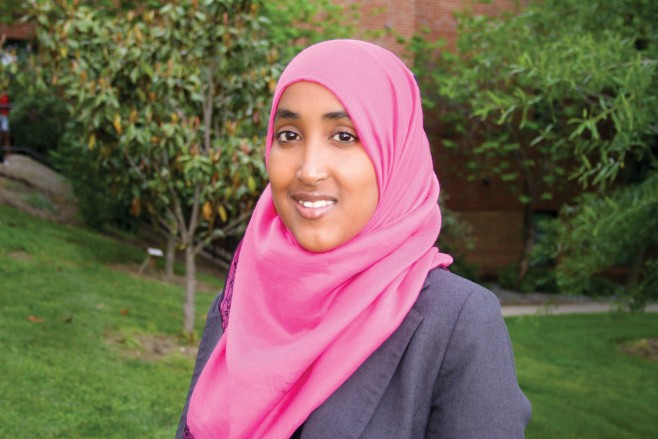
Naema “Nimo” Somo is a lawyer of Somali origins doing government work in northeast Kenya. (Photo by Bonnie Price Lofton)
Recent issues of the Wajir Times, which covers the third-largest county in the northeast of Kenya, chronicle clan warfare, banditry, scarcity of water and land, concerns over attacks by Al Shabab, and civil unrest.
Naema “Nimo” Somo, 28, practices law in the county government and works to build peace in her birthplace – a fractious, sprawling arid land populated primarily by ethnic Somalis. Her work day in the capital of Wajir is punctuated by the calls of the muezzin from the mosque: unlike most of Kenya, Wajir’s population is predominately Muslim.
“We joke that when we are travelling down to Nairobi, that we are going to Kenya,” Somo says of the 300-mile, eight-hour drive that separates her from the capital and her husband. “This is a marginalized county…. Our history is a bloody one, with curfews, heavy military presence” and what she calls a brutal “peace enforcement.”
Her main responsibilities are to legally represent Wajir County and to help develop equitable and constitutional policies and laws that “cover the interests of minority and vulnerable groups.”
One difficulty, Somo says, is “finding a balance between the interests of the county government and community members.” For example, in the process of developing a road, several long-established businesses and shops were demolished. Somo says this situation made her feel “like a villain,” but she eventually provided a solution: relocating the businesses to already constructed business stalls free of charge.
Somo earned her graduate certificate in peacebuilding as a participant in the 2013-15 Women’s Peacebuilding Leadership Program. Of the knowledge gained at SPI ’13, which she attended with four other ethnic Somali women, she counts understanding and analyzing structural violence to be most valuable.
For decades, Wajir has been rocked by civil conflict, as ethnic Somalis, victims of colonial annexation in the 1920s, have fought to unite with their nearby homeland. Clan warfare and a dissolution of the nomadic, pastoral lifestyle have led to further armed conflict, which Kenyan forces attempt to quell with a permanent presence.
Somo was born in Wajir a few years after the Wagalla Massacre, a devastating event explored by Kenya’s Truth, Justice and Reconciliation Committee. (The vice-chair of this committee was Tecla Wanjala, who earned her MA through CJP in 2003.) Somo’s grandfather was left permanently paralyzed from the waist down as a result of this violence: In 1984, soldiers employed by the Kenyan government, dispatched to stop inter-clan warfare over land for grazing cattle, rounded up ethnic Somalis from a certain clan, tortured them, and killed about 5,000.
Somo, who grew up wanting to be a doctor, was encouraged to study law at Nairobi University by her father, who one day “came with his law friend and gave me a long argument as to why I should take up the career.”
She most enjoys the satisfaction of a day in which “I helped someone and justice was met that day.” Winning cases is always a high point, but she much prefers winning cases in which “all parties involved got what they wanted, where all the interests involved were met.”
Some of those wins include out-of-court settlements, which Somo negotiates with the help of conflict transformation strategies learned at SPI.
Asked of a vision for her country, she says: “I want to leave behind a legacy. I would really like to set up strong legal structures that will weather the coming years and generations. I want to make sound laws whereby everyone’s interests are captured and the unjust will not escape. And I want to give more power to the alternative dispute resolution processes so as to calm clan wars.”